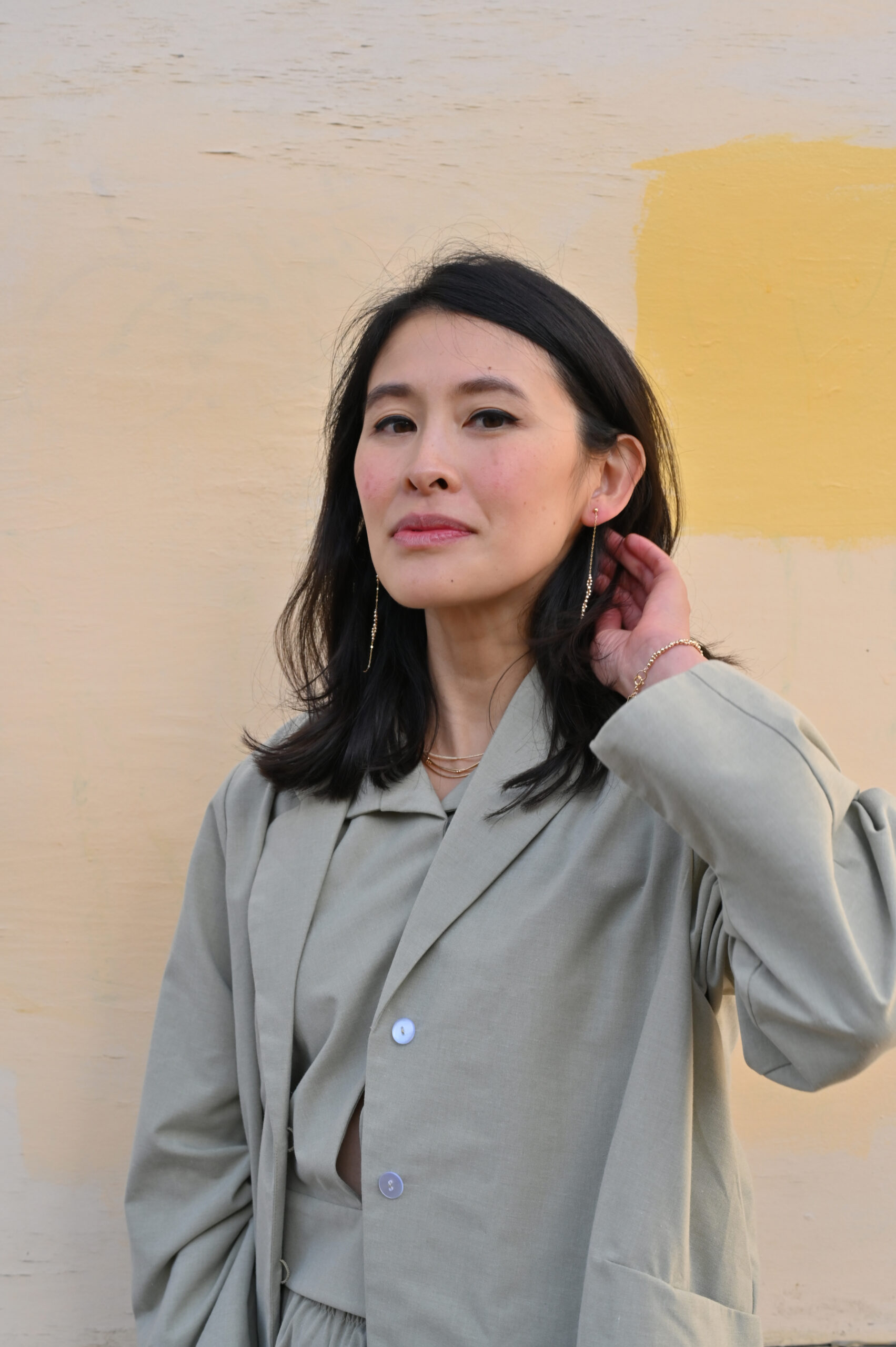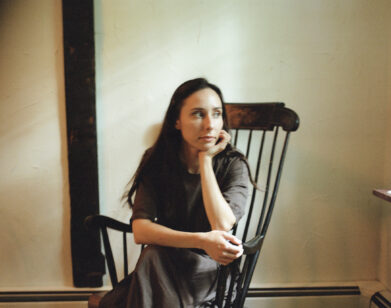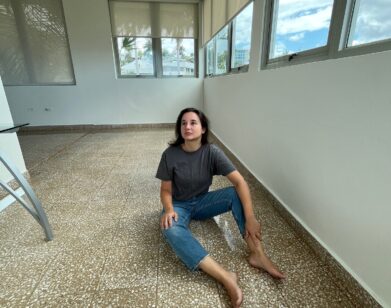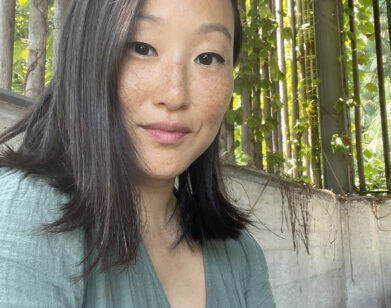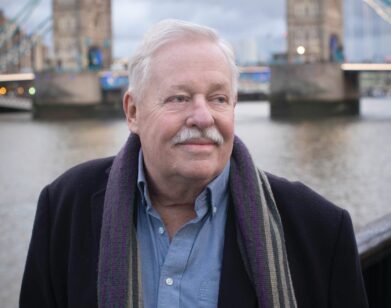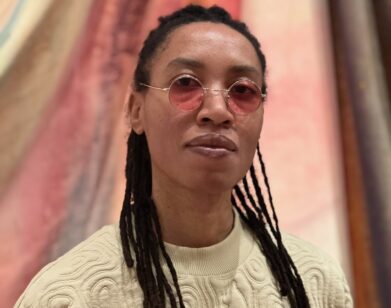LIT
How Rachel Khong Fit Magic, Maoism, and Genetic Manipulation Into Her New Novel
Rachel Khong’s newest novel, Real Americans, asks: what if we could control what genes we passed down to our children? How do what others see in us affect how we perceive ourselves? Real Americans is a brilliant, sprawling, maximalist, multigenerational novel that spans three generations from Moaist China to post-pandemic San Francisco. It’s somehow historical fiction, a love story, a science fiction thriller, a fantasy novel, and a psychological drama all at once. It traverses worlds of opulence and worlds of poverty with equal acuity and grace. Before its publication, Khong and I caught up via zoom and discussed the quiet violence of 23andMe, why speculative writing can feel especially filmic, and the false dichotomy of science vs. magic.
———
RITA BULLWINKEL: Hey.
RACHEL KHONG: Hello. Are you back in San Francisco?
BULLWINKEL: I am. I’m at your old haunt. I’m in the McSweeney’s office taking the call from one of those noise-canceling pods. Have you ever been in one of them?
KHONG: No, I don’t think I’ve been in that office for… I mean, for a long time.
BULLWINKEL: The pods are not good. They’re like the open office floor solution to people talking. So other than being in a pod, I’m great. I’m so grateful that you were willing to do this interview with me.
KHONG: Thank you. I mean, what a gift to get to do it with you.
BULLWINKEL: I am so excited to jump right in and talk about Real Americans. It is a speculative novel that is in part about the social and emotional repercussions of gene manipulation, and in this way I think it’s a book that’s in conversation with the conceit driven work of sci-fi-genius, Ted Chiang. Do you consider this novel a work of science fiction?
KHONG: Oh, that’s a good question. I love Ted Chiang, he’s an amazing writer. I love Charles Yu. I love literary writers who dip into sci-fi, and that’s where this book is situated. I wouldn’t call it sci-fi because I’m scared of offending that community, but there is science in this book and there is fiction. There’s also a little bit of magic.
BULLWINKEL: I do read your work, but this novel specifically, as being incredibly cinematic, and I think that this is because you’re such a master of dialogue. There are so many scenes in Real Americans where I felt like I could almost feel the viewfinder of a camera lens, and I feel this way most often while reading other works of conceit-driven speculative fiction. I’m thinking about the work specifically of Philip K. Dick or Emily St. John Mandel. Do you think that speculative fiction is inherently more filmic?
KHONG: I wonder if that’s true. With those authors in particular, they encourage you to imagine along with them, right? For me, writing often comes from an image. Often there’s something that will stick in my mind, some striking image that I want to get across. I love writing that gives you the right amount of detail so that you can fill in the rest. I don’t really like when people over-describe the way somebody looks. Just tell me that this person has an interesting nose and then I can imagine the interesting nose. It’s a more collaborative and active experience. It’s not just passively consuming television, it’s actually creating this world with the author.
BULLWINKEL: Oh, man, I couldn’t agree more. I feel that so strongly with this book, that the act of reading necessitates bringing your own lived experience to the text in order to bring the character off the page and into your mind. One of the things that this book is circling is how much of who we are is inherently hidden from others. In the book, part of what gets hidden against certain character’s wills is their genes and the physical expression of their racial identity, but there’s also a great deal else that these characters keep from one another and that is purposefully kept from them. What do you think lies inside the gap between how characters in Real Americans see themselves and how others see them?
KHONG: I mean, it’s such a big part of the book, that disconnect between how others view you and how you feel. But we’re also just mysteries to ourselves, right? The characters believe certain things about themselves and discover that things are different along the way. I really started from a place of my own experience of feeling like I’m an American because that is what I have known. I came to this country when I was two years old and I don’t remember being from another country. I left when I was two and then went back to visit my family growing up, but I don’t have any connection to Malaysia in terms of the language or the culture. Growing up here there was this constant question of, “Where are you from?” It’s changing these days, but there’s this pretty ingrained idea that Americans look a certain way. So there was this disconnect for me personally in that I felt fully American, but when other people encountered me, that wasn’t their first reaction. All the characters have their own version of that, of being misunderstood because of how they appear. It’s always interesting to me, this failure in communication that we have with one another, the ways in which we try to say who we are and then are misunderstood. It’s where a lot of heartbreak happens, but it’s also where connection ultimately can happen.
BULLWINKEL: Yeah. It’s present for all of the characters, but I wonder if it’s present most loudly for Nick, who is half-Chinese, but doesn’t look Chinese. I’m curious about how that gap is functioning for him?
KHONG: Yeah. He’s afforded so many privileges because of the way that he looks, but to him, he’s very much frustrated by the way that people can’t see him for who he is fully. And the only parent that he’s known all his life is Chinese, and he feels Chinese too. That tension between who you feel that you are and who other people insist you are is so fascinating to me. Especially in this country, where it’s so much about the way that people present themselves and what groups they belong to.
BULLWINKEL: Yeah. The scene where Nick is basically forced to do 23andMe was stressful. He gets peer pressured into doing genetic tests, and something was so violating about that.
KHONG: Yeah. Obviously it did say something that eventually was really impactful, but there’s a limit to what these results can say about you. They can’t tell you anything about who your family actually was, it’s just this thing that provides data about you. That’s a big part of this book too, the tension between technology and us. Part of the stress for me was, here’s this well-meaning friend insisting that he submit his saliva to this tech giant who’s going to take his data, but also tell him about himself in quotes, but what does he really know from that result?
BULLWINKEL: Yeah. Even though we learned something important as the reader, it felt so insufficient. There’s a really intense violence there in the datafication of a person.
KHONG: Yeah. That’s part of the project of this book. We’re all so unique and singular and you can’t, I don’t even know what the verb is, algorithmatize everything.
BULLWINKEL: Right. In a different direction, one of the real treats for me as a reader was that, sprinkled throughout the entire book, there were these incredible descriptions of food. I’m thinking specifically of the first meal that Matthew and Lily share and those Bacchanal feasts in the Hamptons. I really feel that you write about food like Ottessa Moshfegh writes about fashion, where it’s part of the scene, but it’s so vibrant and vivid and felt. I know that you were the long time editor of the food magazine Lucky Peach. Is food one of your superpowers? How do you see food functioning in this book?
KHONG: Rita, you are an amazing cook also, so I’m–
BULLWINKEL: Oh, no, no, no.
KHONG: –honored that you feel this way. Food is so interesting because we have to eat it every day, and that’s the rare thing that every human has in common. And for me personally, I just think about it a lot. But food also has so much wrapped up in it in terms of its connections. Food can be really utilitarian. It can keep you alive, but it can also be incredibly expensive. It could be a marker of status. It could be something that you could take a date to a nice restaurant and impress her that way as Matthew does with Lily in one of the very first scenes. With this book especially, it was such an opportunity to really depict the extremes of what a wealthy family would eat and who would prepare that food for them compared to a girl who is starving in China during the early years of the Cultural Revolution. One of the main questions in the book is, how is this fair? Why does one family get to eat lobster that their chef has prepared and another family, just because they were born somewhere else, has to be eating weeds and stuff and struggling to survive? Those poles of existence are wild to me, in terms of the fact that pure luxury exists and that it’s still so aspirational. In the book, Lily has exposure to all of these decadent meals. And in the end, what she wants is just home-cooked meals with her family, because she ultimately finds that there’s something hollow in the luxury that money affords you.
BULLWINKEL: Yeah. In that vein, another thing I think this book is questioning is how class shapes our interior world and the world around us, and what happens when class dynamics get muddled. Do you think Real Americans treads in those questions of what happens when someone’s class identity becomes no longer clear?
KHONG: Yeah. I mean, class is something that, like money, isn’t really talked about that much. And these characters have this difficulty moving between classes, because it is difficult. They’re these markers of belonging, and those are just arbitrary, learned things. For me growing up, my parents weren’t readers and they didn’t have any books. I mean, they had the Bible, and they love the Bible. But I didn’t even realize that you could have libraries of books, or that you could own books at home. And it was only when I got to college that I met people who had parents who were writers or read a lot. It was shocking to me, and I felt this was a language that I now had to learn. It was like this whole other realm that I never had access to. And when you’re moving into this whole other culture, it’s really uncomfortable and you’re leaving things behind.
BULLWINKEL: Yeah. I won’t include any spoilers, but Lily makes some really intense decisions based on her traversing between class territory.
KHONG: Yeah. She’s initially hesitant to make that jump to a different class, even though anybody would understand marrying into money, but that’s not actually one of her priorities. It’s not ultimately who she is.
BULLWINKEL: I have two more questions. This is an intergenerational novel, and in this book we meet three generations of a family, from May growing up in Maoist China to her grandson Nick, who works in the San Francisco post-pandemic in the biotech world. What do you think gives intergenerational novels their particularly potent powers?
KHONG: Something I was interested in with my first novel was the fact that your parents know things about you that you don’t remember about yourself. There are these huge swaths of time that you don’t personally recall, but your parents do and they somehow have more knowledge about you. And you also don’t know so much about your parents, right? There’s a whole life that they lived before you, and you can judge them for who they are right now, but there’s so much richness in their past lives. So the multi-generational novel collapses all of those timelines and it adds so much context to people that you might have preconceived ideas about. You might see the grandmother on the street who’s picking up bottles for recycling and believe that you know her story, but you definitely don’t. And it’s not in chronological order by design. I wanted it to be a book that you could access more immediately at first, because it didn’t feel historical. 1999 arguably might feel historical to some for some youngin’s, but for the most part it feels still like a recognizable era, and I wanted to pull you in with these characters and this family first and then go further back into history and surprise you with how, even though a story might be 60 years old, it can still feel immediate.
BULLWINKEL: Definitely. Without including a spoiler, at the end of the book, it’s revealed that a special power has been passed down from May to Lily to Nick that cannot be explained by the gene manipulation. Is it magic, and is this a book that has magic in it?
KHONG: Yes, it is magic, and it is a book that has magic in it. Honestly, I struggled with that for a really long time because I thought, “this is a book about science.” And a book involving magic can’t coexist with science. It felt too unwieldy to me. I had these characters experiencing these time blips all throughout the book, and I didn’t know why they were blipping, I just knew that it was happening. Then, a few years into writing this book, I thought, “What if it’s actually magic that happens to them because of a wish that one of the characters makes?” One of the reasons that it felt right was that this is a book about the limits of our human perception and our ability to understand others. But it’s also about the limits of our ability to understand the world and the universe. Science gives the impression that we can understand everything and that it can become data. Magic is essential to the book because it nods at this reality that a lot is still very mysterious to us, especially in this world where we believe we know so much. It’s this case for humility and for believing that we just might not know everything.
BULLWINKEL: Rachel, the book is so brilliant. Thank you for taking the time to talk with me about it today.
KHONG: Thank you. You’re the best interviewer.

